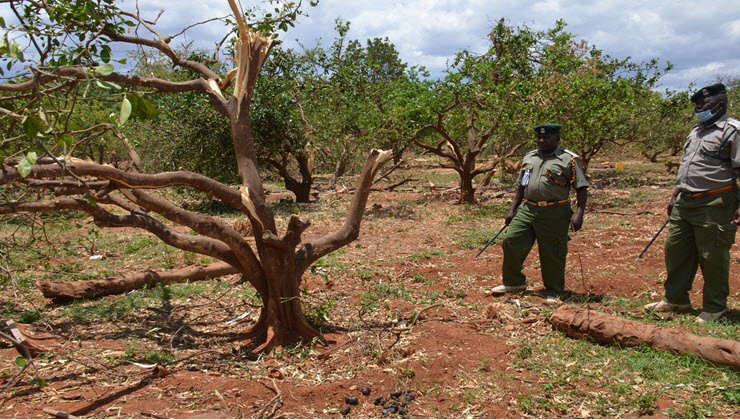A family of elephants from the Tsavo National Park has been on the loose causing massive destruction to the Manyani Maximum Security Prison’s 20-acre farm.
“About 20 jumbos have been invading the farm every night for months. They have destroyed food, fruits, and vegetables. Our losses are huge,” said Bison Madengwa, the officer-in-charge of Manyani and the County Prisons Commander.
But it is not just elephants that have invaded this heavily fortified facility. At dawn, after elephants leave, large troops of incredibly daring and viciously aggressive baboons descend on Manyani to carry out lightning-fast raids in wardens’ houses, fleeing with anything edible.
And while this act of human-wildlife conflict takes place, one baboon remains perched on top of a post, acting as a look-out for any approaching human.
Victims of these raids agree that these sneaky apes have acquired a bizarre appetite for raw eggs and maize flour.
“They even protect egg yolk to make sure it doesn’t spill,” says a warden who lost a tray of the commodity to the baboons while on daytime shift.
Manyani Maximum Security Prison along the Nairobi-Mombasa Highway in Voi sub-county, Taita-Taveta County is undoubtedly one of the most secure correctional facilities in the country.
Surrounded by acres of wild bush teeming with wild animals, uninhabitable hills and punishingly high temperatures, the facility is virtually inaccessible.
Visitors are only allowed entry on a need basis and even then, after strict vetting. With dozens of armed hawk-eyed wardens conducting patrols at any one time, towering 20-feet brick walls and razor wires, this fortress is impregnable.
The unprecedented invasions from the twin intruders that have intensified since April have become a constant headache that shows no sign of going away any time soon.
With the fall of dark, the family of jumbos rumble its way into the 20-acre farm. What follows is destructive sprees marked by feasting and uprooting of fruit trees and vegetables, wild trumpeting, fights and charges as the animals turn the farm into a fun park. At dawn, acres of oranges trees, pixies, tangerines, coconuts and mangoes are flattened.
When elephants exit, baboons take over. They emerge in waves from their hideouts in the rocky hills in their hundreds and sneak in wardens’ quarters hunting for anything edible.
However, while baboons can be scared off by loud noises or the appearance of a person, the elephants are more dangerous and often charge when provoked putting lives of wardens at risk.
The county prisons commander has said these invasions, especially by the elephants, have caused massive destruction with huge losses. He approximates that 30-acres of crops including fruit trees like the rare Ivory Coast coconuts and pixies trees have been ruined.
“The officers here are having sleepless nights driving the elephants back into the bushes because we need to protect the farm. Sadly, we have lost it,” said Madengwa.
Only when one sees the current status of the 20-year old iconic Manyani orchard does the gravity of the destruction start to seep in. The loss is palpable, with hundreds of orange trees either uprooted or having their trunks snapped; tall trunks of coconut trees lying on the bare field and massive branches of mango trees snapped into half.
Not a single green leaf is seen from the vegetable farm that months ago was bursting with lettuce, spinach, kales and Mchicha.
Nevertheless, the farm manager Meshack Kioko tries to put up a brave face. The farm has been his personal responsibility.
This is where he spends his days with inmates, tending to the crops and vegetables to keep the thousands of inmates and staff supplied with food, but now all that is gone.
He admits he even uprooted banana trunks to keep the elephants from coming but it was all in vain. At the same time, burning of dried-up elephant dung to irritate the jumbos and keep them at bay also failed. A 4-feet deep trench dug at the fence has equally not worked.
Meanwhile, the current prolonged dry conditions in the region has contributed to the situation. While the surrounding areas are parched with no water, Manyani remains an island of green, one ripe with assorted vegetable and fruit trees. The facility is also served with water from Mzima Springs.
There are also claims that the elephants are not making use of SGR crossings that allow them to move from Tsavo West to Tsavo East National Park.
“We grow our own food and we have water. These factors have now made the elephants camp here,” explains Madengwa.
The loss of the farm is poignant. Manyani farm was not just a model for best agricultural practices where inmates were taught on modern methods of farming, but has also been a reliable source of food for the prison community with an average daily vegetable production of 70-kg.
“We supplied our own food but the elephants have made sure nothing grows,” said the farm manager.
He says their Greening Kenya Initiative has also suffered after many Neem trees planted were destroyed by the elephants.
Kenya Wildlife Service (KWS) have been of little help. While rangers often come to help drive the jumbos away, their efforts have not yielded the desired results. There are claims that the rangers are fatigued by the repetitiveness drudge of pushing the jumbos away every night.
The most pressing concern for the facility at the moment is to keep the elephants away with a view to reopening the farm for agricultural activities.
In the meantime, there were reports the facility has reached out to the Problem Animal Management Unit to help deal with the menace.










